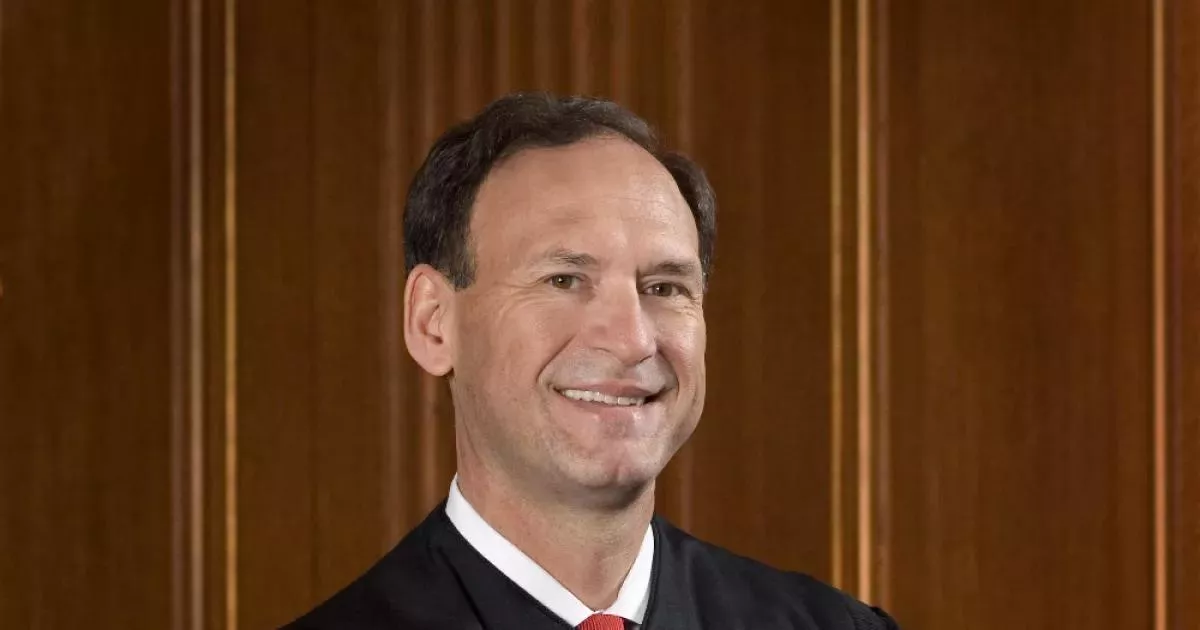Samuel Alito is an Associate Justice of the Supreme Court of the United States, nominated by President George W. Bush. He has served on the court since January 31, 2006. Alito is the second Italian American justice to serve on the U.S. Supreme Court, following Antonin Scalia.
April 1, 1950: Samuel Alito's Birth
On April 1, 1950, Samuel Anthony Alito Jr. was born. He is an American jurist who serves as an associate justice of the Supreme Court of the United States.
1952: Father's Position in NJ Government
In 1952, Samuel A. Alito Sr., Samuel Alito's father, became the first director of the New Jersey Office of Legislative Services.
1964: Dissenting Opinion on Title VII Interpretation
In 2020, Alito wrote a dissent, joined by Thomas, to Bostock v. Clayton County, arguing that Title VII of the Civil Rights Act of 1964 does not prohibit discrimination based on sexual orientation or gender identity. He also criticized the majority's interpretation of Title VII.
1964: Barry Goldwater's Presidential Campaign
In his 1985 application for Deputy Assistant Attorney General, Alito named Barry Goldwater's 1964 presidential campaign as a major influence.
1968: Graduation from Steinert High School
In 1968, Samuel Alito graduated from Steinert High School as the class valedictorian.
December 1969: Received Low Lottery Number
In December 1969, Samuel Alito, then a sophomore at Princeton, received a low lottery number of 32 in the Selective Service drawing.
1971: Chaired Student Conference
In 1971, while at Princeton, Samuel Alito chaired a student conference called "The Boundaries of Privacy in American Society" which advocated for curbs on domestic intelligence gathering.
1972: Graduation and Aspirations
In 1972, Samuel Alito graduated from Princeton and expressed his aspiration to "eventually warm a seat on the Supreme Court" in his yearbook.
1972: Graduation from Princeton University
In 1972, Samuel Alito graduated summa cum laude from the Woodrow Wilson School of Public and International Affairs at Princeton University with a Bachelor of Arts degree. His senior thesis was on the Italian Constitutional Court.
1972: Commissioned as Second Lieutenant
In 1972, Samuel Alito was commissioned as a second lieutenant in the United States Army Reserve while he was studying at Princeton.
1975: Juris Doctor from Yale
In 1975, Samuel Alito earned a Juris Doctor degree from Yale Law School, where he also served as an editor of the Yale Law Journal.
1975: Started Military Duty
In 1975, after graduating from law school, Samuel Alito began his military duty, serving on active duty from September to December while attending the Signal Officer Basic Course at Fort Gordon, Georgia.
1976: Clerkship for Judge Garth
In 1976, after graduating from law school, Samuel Alito clerked for Third Circuit appeals judge Leonard I. Garth in Newark, New Jersey.
1977: Assistant US Attorney
From 1977, Samuel Alito served as Assistant United States Attorney, District of New Jersey.
1980: Honorably Discharged
In 1980, Samuel Alito completed his service obligation as a member of the inactive reserve and was honorably discharged.
1981: Assistant to U.S. Solicitor General
From 1981, Samuel Alito was Assistant to U.S. Solicitor General Rex E. Lee, arguing cases before the Supreme Court.
1981: Continued as Assistant US Attorney
In 1981, Samuel Alito was still serving as Assistant United States Attorney, District of New Jersey.
1984: Father's Retirement
In 1984, Samuel A. Alito Sr., Samuel Alito's father, retired from his position as the director of the New Jersey Office of Legislative Services, a role he had held since 1952.
1985: Deputy Assistant Attorney General
From 1985, Samuel Alito served as Deputy Assistant Attorney General under Charles J. Cooper in the Office of Legal Counsel.
1985: Marriage to Martha-Ann Bomgardner
In 1985, Alito married Martha-Ann Bomgardner, a law librarian. They have two children, and Martha-Ann left her profession to raise them.
1985: Continued as Assistant to U.S. Solicitor General
In 1985, Samuel Alito was still serving as Assistant to U.S. Solicitor General Rex E. Lee.
1986: Authored Memoranda
In 1986, Samuel Alito authored nearly 470 pages of memoranda arguing for expanding his client's law enforcement and personnel authorities.
1986: Thornburgh v. American College of Obstetricians & Gynecologists
In 1986, the Supreme Court ruled against Charles Fried in Thornburgh v. American College of Obstetricians & Gynecologists, after Fried rejected a memo from Samuel Alito.
1987: US Attorney for the District of New Jersey
From 1987, Samuel Alito served as the United States Attorney for the District of New Jersey.
1987: Continued as Deputy Assistant Attorney General
In 1987, Samuel Alito continued to serve as Deputy Assistant Attorney General under Charles J. Cooper in the Office of Legal Counsel.
March 1988: Sought Extradition Rehearing
In March 1988, Samuel Alito sought a rehearing of extradition proceedings against two Indian men after discovering his prosecutor had sent death threats to herself.
August 1988: Accetturo Trial Ends
In August 1988, the two-year trial of 20 defendants accused of being mob affiliates of Anthony Accetturo ended in their acquittal.
1989: Prosecution of Japanese Red Army Member
In 1989, Samuel Alito prosecuted a member of the Japanese Red Army for planning a terrorist bombing in Manhattan.
February 20, 1990: Nomination to the Third Circuit
On February 20, 1990, President George H.W. Bush nominated Samuel Alito to the United States Court of Appeals for the Third Circuit.
April 27, 1990: Confirmation to the Third Circuit
On April 27, 1990, Samuel Alito was confirmed by unanimous consent in the Senate to the United States Court of Appeals for the Third Circuit.
1990: Appointed as a Judge
In 1990, Samuel Alito was appointed as a judge on the U.S. Court of Appeals for the Third Circuit.
1990: Continued as US Attorney
In 1990, Samuel Alito was still the United States Attorney for the District of New Jersey.
1995: Saint Thomas More Medal
In 1995, Alito received Seton Hall University School of Law's Saint Thomas More Medal "in recognition of his outstanding contributions to the field of law".
1999: Adjunct Professor at Seton Hall
From 1999 to 2004, Alito was an adjunct professor at Seton Hall University School of Law in Newark, teaching courses in constitutional law and a course on terrorism and civil liberties.
2002: NSA Surveillance of Alito
In 2002, the National Security Agency (NSA) began targeting Alito's phones, and those of his staff and family, for surveillance.
2003: Partial-Birth Abortion Ban Act
In 2003, Congress passed the Partial-Birth Abortion Ban Act, leading to the Gonzales v. Carhart lawsuit. This occurred after the Court's decision in Stenberg v. Carhart, and following changes in the Court's membership, with Alito replacing O'Connor.
2003: NSA Surveillance of Alito Continues
In 2003, the National Security Agency (NSA) continued targeting Alito's phones, and those of his staff and family, for surveillance.
2004: End of Tenure at Seton Hall
In 2004, Alito's time as an adjunct professor at Seton Hall University School of Law in Newark concluded, after teaching courses in constitutional law and a course on terrorism and civil liberties since 1999.
July 1, 2005: O'Connor Announces Retirement
On July 1, 2005, Associate Justice Sandra Day O'Connor announced her retirement from the Supreme Court, creating a vacancy.
October 31, 2005: Nomination to the Supreme Court
On October 31, 2005, Samuel Alito was nominated to the Supreme Court of the United States by President George W. Bush.
2005: Differing Views from Justice Scalia
In 2005, Alito's views were shown to differ from those of Justice Scalia, despite the nickname "Scalito," as seen in the Michael Taylor case and other cases during the 2005 term. SCOTUSblog analysis showed that Alito and Scalia agreed on the result of 86% of decisions and concurred fully in 75% of them.
January 31, 2006: Service on the Supreme Court begins
On January 31, 2006, Samuel Alito began his service as an associate justice of the Supreme Court of the United States.
February 1, 2006: First Supreme Court Decision
On February 1, 2006, Alito participated in his first decision on the Supreme Court, voting with the majority (6–3) to refuse Missouri's request to vacate the stay of execution for death-row inmate Michael Taylor. Justices Roberts, Scalia and Thomas favored vacating the stay.
May 1, 2006: First Supreme Court Opinion
On May 1, 2006, Samuel Alito delivered his first written Supreme Court opinion in Holmes v. South Carolina.
2006: Confirmation Hearing
From January 9 to 13, 2006, Samuel Alito's confirmation hearing was held, where he answered approximately 700 questions over 18 hours of testimony.
April 18, 2007: Partial-Birth Abortion Ban Act Upheld
On April 18, 2007, the Supreme Court ruled the Partial-Birth Abortion Ban Act constitutional. Kennedy wrote for the five-justice majority, asserting that Congress had the power to ban the procedure while leaving open the possibility of as-applied challenges. He stated that the statute aligned with prior decisions in Roe v. Wade, Planned Parenthood v. Casey, and Stenberg v. Carhart.
May 25, 2007: Seton Hall Law Commencement Address
On May 25, 2007, Alito delivered the commencement address at Seton Hall Law's commencement ceremony and received an honorary law degree from the school.
2007: Morse v. Frederick Decision
In the 2007 landmark free speech case Morse v. Frederick, Alito joined Roberts's majority decision that speech advocating drug use can be banned in public schools. He also cautioned that the ruling should not interfere with political speech, such as discussions of medical marijuana.
2008: Failure to Disclose Gifts
According to a ProPublica investigation, Alito was obligated to disclose certain benefits as gifts on his 2008 Financial Disclosure Report but did not.
2008: Gomez-Perez v. Potter Decision
In 2008, Alito wrote the majority opinion in Gomez-Perez v. Potter, a worker protection case. The decision allowed federal workers who face retaliation after filing age discrimination complaints to sue for damages, siding with the court's liberal bloc.
2008: Delivered Supreme Court Historical Society Lecture
In 2008, Samuel Alito delivered the Supreme Court Historical Society's Annual Lecture, "The Origin of the Baseball Antitrust Exemption".
2010: Majority opinion in McDonald v. Chicago
In 2010, Alito wrote the majority opinion in the case of McDonald v. Chicago regarding firearm rights.
2011: Visiting Professor at Duke University
In fall 2011, Alito was a visiting professor at Duke University School of Law, teaching Current Issues in Constitutional Interpretation.
2012: Teaching at Duke University
In summer 2012, Alito taught a course in the Master of Laws in Judicial Studies program as a visiting professor at Duke University School of Law.
2013: NSA Surveillance Revealed
In 2013, former NSA analyst Russell Tice revealed that during 2002 and 2003, the NSA targeted Alito's phones, as well as those of his staff and family, for surveillance as part of the fallout from the Edward Snowden case.
June 3, 2014: Lunch with Conservative Donor Gayle Wright
On June 3, 2014, Alito and his wife had lunch with Gayle Wright, a conservative donor. Rob Schenck claimed that Wright informed him of the outcome and author, Alito, of the Burwell v. Hobby Lobby decision shortly after this lunch.
June 2014: Burwell v. Hobby Lobby Decision
In June 2014, the Supreme Court handed down the Burwell v. Hobby Lobby decision. Alito authored the decision favorable to anti-abortion conservatives. Weeks before, Rob Schenck claimed to have learned of the outcome from Gayle Wright, who had recently had lunch with Alito.
2014: Majority opinion in Burwell v. Hobby Lobby
In 2014, Alito wrote the majority opinion in Burwell v. Hobby Lobby, a case concerning insurance coverage.
2018: Majority opinion in Janus v. AFSCME
In 2018, Samuel Alito wrote the majority opinion in Janus v. AFSCME, which concerned public-sector union security agreements.
October 2020: Denial of Appeal Filed by Kim Davis
In October 2020, Alito agreed with the other justices on the denial of an appeal filed by Kim Davis, a county clerk who refused to issue marriage licenses to same-sex couples.
November 12, 2020: Comments on COVID-19 Restrictions
On November 12, 2020, Alito spoke to the Federalist Society, criticizing the "loss of individual liberties" during the COVID-19 pandemic and calling the restrictions "severe, extensive and prolonged." He described the pandemic as "a Constitutional stress test."
2020: Shift to Conservative Majority
According to The New Yorker, since the 2020 appointment of Justice Amy Coney Barrett, Alito has become "the embodiment of a conservative majority that is ambitious and extreme", overruling progressive precedents from the 1960s and '70s that were previously out of conservatives' reach.
2020: Reactions to Alito's Actions
In 2020, Alito's actions sparked mixed reactions, with Democrats condemning him and Republicans defending him. Calls for recusal from cases related to the January 6 Capitol attack and the 2020 presidential election were made, along with a resolution to censure Alito. Some senators defended Alito, calling the controversy an intimidation attempt.
2020: Involvement of Stop the Steal Movement
In January 2021, an upside-down American flag was flown outside Alito's residence in Alexandria, Virginia, which was displayed by members of the Stop the Steal movement in 2020, an attempt to overturn the presidential election.
January 17, 2021: Upside-Down American Flag Incident
On January 17, 2021, an upside-down American flag was flown outside Alito's residence in Alexandria, Virginia. The flag was associated with supporters of Donald Trump during the January 6 Capitol attack and the Stop the Steal movement.
February 2022: Circulation of Draft Opinion on Dobbs v. Jackson
In February 2022, Alito's first draft of the majority opinion for Dobbs v. Jackson Women's Health Organization, which would overturn Roe v. Wade, was circulated among the Supreme Court justices.
May 2, 2022: Leak of Draft Opinion Overturning Roe v. Wade
On May 2, 2022, Politico published a leaked first draft of a majority opinion by Alito, circulated among the justices in February 2022, for the upcoming decision in Dobbs v. Jackson Women's Health Organization. The opinion would overturn Roe v. Wade and Planned Parenthood v. Casey.
June 24, 2022: Roe v. Wade Overturned
On June 24, 2022, the Supreme Court handed down the ruling in Dobbs v. Jackson Women's Health Organization, overturning Roe v. Wade and Planned Parenthood v. Casey. Alito wrote that "Roe was egregiously wrong from the start" and that it had "enflamed debate and deepened division".
July 2022: Public Comments on Overturning Roe v. Wade
In July 2022, Alito made his first public comments on the ruling overturning Roe v. Wade at a Notre Dame Law School event in Rome. He mocked foreign leaders, including Boris Johnson and Prince Harry, for criticizing the decision.
October 2022: Comments on Assassination Threats and Court Integrity
During an October 2022 talk at The Heritage Foundation, Alito mentioned that the leaked opinion in Dobbs v. Jackson Women's Health Organization made some justices "targets for assassination". He also said that "questioning [the Court's] integrity crosses an important line", viewed as criticism of Kagan's statements.
November 2022: Alleged Previous Supreme Court Decision Leak
In November 2022, amidst an investigation into the Dobbs v. Jackson leak, it was revealed that Rob Schenck had written a letter to Roberts about an alleged leak of the Burwell v. Hobby Lobby decision. Schenck claimed to have known the outcome weeks before the June 2014 announcement.
2022: Majority opinion in Dobbs v. Jackson Women's Health Organization
In 2022, Alito wrote the majority opinion in Dobbs v. Jackson Women's Health Organization, a case regarding abortion.
2022: Only Military Veteran on the Court
Since Stephen Breyer's retirement in 2022, Alito has been the only military veteran on the Court. He is also a baseball fan and a longtime supporter of the Philadelphia Phillies. The Phillie Phanatic appeared at his Supreme Court welcome dinner.
April 21, 2023: Dissent on Mifepristone Ruling
On April 21, 2023, Alito dissented when the Supreme Court reversed a ruling by Judge Matthew Kacsmaryk that would have banned mifepristone (an emergency contraception medication) nationwide.
June 20, 2023: ProPublica Investigation on Alito's Relationship with Paul Singer
On June 20, 2023, ProPublica reported on Alito's relationship with billionaire businessman Paul Singer, focusing on their trip to a luxury fishing resort in Alaska. The report suggested Alito "violated a federal law that requires justices to disclose most gifts", such as private jet travel, and that he should have recused himself from cases involving Singer.
July 2023: Controversy over Congressional Authority
In July 2023, Alito wrote a Wall Street Journal opinion column stating that the Constitution doesn't give Congress the authority to regulate the Supreme Court, leading to further debate among lawmakers.
2023: Most Conservative Justice
In 2023, Martin–Quinn scores indicated that Alito was the most conservative Supreme Court justice. Although his voting record is generally conservative, he doesn't always align with the Court's other conservative justices.
2023: Pine Tree Flag Incident
In the summer of 2023, the Pine Tree Flag was flown at Alito's beach house on Long Beach Island in New Jersey. The flag, linked to Christian nationalists and the Capitol attack, caused controversy due to questions about judicial impartiality while the Supreme Court considered United States v. Fischer (2023).
June 2024: Controversial Secret Recording
In June 2024, Alito faced controversy when a secret recording surfaced of him agreeing with the assertion that Christians should win "the moral argument" and return the country to "a place of godliness." He stated that "one side or the other is going to win" regarding political polarization.
June 2024: Martha-Ann Alito's Flag Remarks
In June 2024, Martha-Ann Alito was recorded discussing her intention to display a Sacred Heart of Jesus flag in response to a Pride flag, expressing her desire to replace the flags and stating her German heritage would lead her to retaliate against media scrutiny.
2024: Member of Supreme Court
As of 2024, Samuel Alito is one of six Catholic justices on the Supreme Court.
2024: Acceptance of Tickets from Princess Gloria von Thurn und Taxis
In 2024, it was reported by The Guardian and The New York Times that Alito accepted $900 tickets from Princess Gloria von Thurn und Taxis for a music festival at Saint Emmeram's Abbey.
Mentioned in this timeline

George W Bush the rd U S President - is...
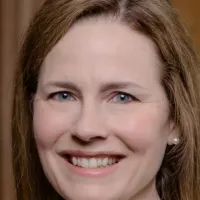
Amy Coney Barrett is an American lawyer and jurist who...
Virginia a state in the Southeastern and Mid-Atlantic US lies...
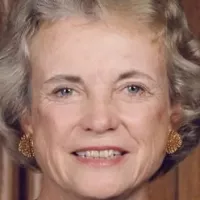
Sandra Day O'Connor was a pioneering American jurist who served...
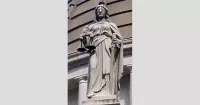
Justice in its broadest sense is the concept of treating...
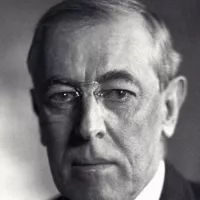
Woodrow Wilson the th U S president - was a...
Trending

29 minutes ago Rosamund Pike recalls Judi Dench's 'naughty' side, calling her a 'mischief maker'.

1 hour ago Declan Rice's behavior scrutinized after derby win; Scholes deems him too emotional.

1 hour ago Donovan Clingan shines for Trail Blazers: Draft prospect improves shooting and raises questions.
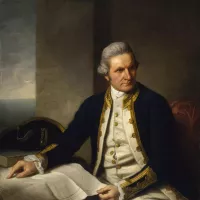
30 minutes ago James Cook and Dion Dawkins to appear at Dick’s House of Sport opening.

1 hour ago Shakira's Mexico City Concert: Security, Tickets, and Traffic Updates

1 hour ago Courteney Cox wears 90s jeans, stays overnight with on-screen husband Greg Kinnear.
Popular

Jesse Jackson is an American civil rights activist politician and...

Susan Rice is an American diplomat and public official prominent...

Barack Obama the th U S President - was the...

Michael Joseph Jackson the King of Pop was a highly...

XXXTentacion born Jahseh Dwayne Ricardo Onfroy was a controversial yet...

Bernie Sanders is a prominent American politician currently serving as...
